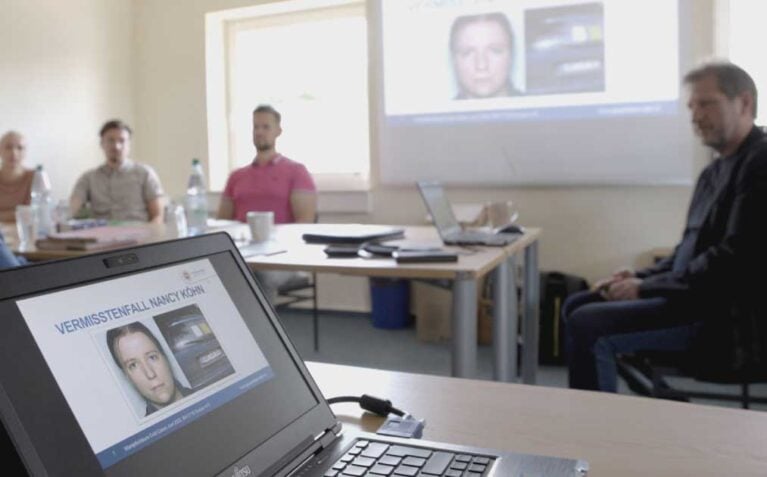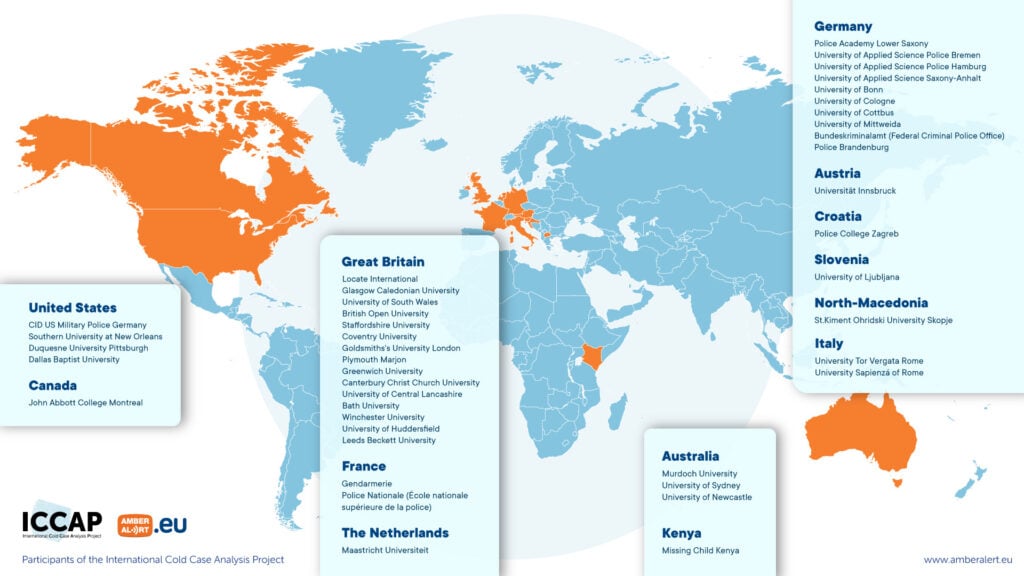Project
International Cold Case Analysis Project

International Cold Case Analysis Project
The International Cold Case Analysis Project (ICCAP), the world’s largest international cold case project, is a global cooperation on cold cases between police colleges and universities under the umbrella of AMBER Alert Europe and in cooperation with the Police Academy of Lower Saxony and Locate International.
ICCAP, which was launched in 2020, enables young police officers and students to establish a close link between theory and practice in cold cases. In a remarkable display of collaboration, the project brings together 53 organisations, over 1000 students, and participants from 12 countries, all working together to solve cases. Additionally, the participants aim to help families across Europe find closure after the disappearance of a loved one by trying to uncover new leads in cold cases.

Students working on real-life cold cases
During ICCAP, teams of diverse young scientific minds from a variety of academic fields from different countries and cultures review a real-life cold case using today’s knowledge, practices and technology in forensic science including digital forensics, forensic archaeology, forensic anthropology and forensic psychology.
ICCAP is a leading force in cold case investigation, taking a fresh approach to cases dating back to 1969. During ICCAP, participants have examined 52 cold cases in detail, focusing on 15 missing persons cases, which make up a shocking 28.8% of their workload. The participants also dug into 37 homicide cases, with 15 involving unidentified victims and a surprising 40.5% starting as missing persons cases before turning into homicides.
Bridging tomorrow's expertise to yesterday's cases
ICCAP’s goal is to use modern forensic science, digital forensics, and criminology to solve yesterday’s cases with tomorrow’s expertise. This not only helps in solving cases but also enriches education and advances criminal investigation methods. ICCAP acts as a bridge between academia and real-world crime-solving, involving academic institutions, law enforcement, and non-profits.
Participating organisations

- Police Academy of Lower Saxony (DE)
- Leeds Beckett University (UK)
- South Wales University (UK)
- Central Lancashire University (UK)
- Glasgow Caledonian University (UK)
- Staffordshire University (UK)
- Plymouth Marjon University (UK)
- Bath University (UK)
- Winchester University (UK)
- St. Kiment Ohridski University Skopje (MKD)
- Bonn University (DE)
- University of Cottbus (DE)
- Murdoch University (AUS)
- Canterbury Christ Church University (UK)
- Police College Zagreb (HR)
- Greenwich University (UK)
- Goldsmith’s University of London (UK)
- French Gendarmerie (FR)
- University of Applied Science Police Bremen (DE)
- University of Mittweida (DE)
- University of Applied Science Police Saxony-Anhalt (DE)
- German Federal Criminal Police Office Wiesbaden (DE)
- Coventry University (UK)
- Locate International (UK)
- Innsbruck University (DE)
- British Open University (UK)
- Cologne University (DE)
- Bundeskriminalamt (DE)
- Police Brandenburg (DE)
- University of Applied Science Police Hamburg (DE)
- Maastricht University (NL)
- John Abbott College Montreal (CAN)
- Southern University New Orleans (USA)
- CID US Army (USA)
- Duquesne University (USA)
- University of Sydney (AUS)
- École Nationale Supérieure de la Police (FR)
- University of Ljubljana (SLO)
- Sapienza University of Rome (IT)
- University of Tor Vergata Rome (IT)
- Dallas Baptist University (USA)
Notable cases investigated by ICCAP
The Gentleman
ICCAP garnered global attention while investigating a 1994 North Sea homicide. The unidentified victim, dubbed “The Gentleman” due to his refined clothing and appearance, continues to be a focal point in cold case studies.
Nancy Köhn
Disappearing from her home in the Cuxhaven district, Nancy Köhn’s case remains shrouded in mystery. It was scrutinized by 38 students from seven universities across four countries, striving to uncover the truth behind her disappearance.
Unidentified Infant
In 2014, a tragic discovery was made at a rest stop on the A1 in Bakum—the lifeless body of an infant later named Johannes Gethsemane. Along with three other cases of neonaticide, this heartbreaking case was analyzed by 31 students from 11 universities across four countries, culminating in a comprehensive investigative report.

How students can enroll in ICCAP
ICCAP showcases remarkable cooperation with 53 organisations, over 1000 students, and participants from 12 countries joining forces. This effort not only enhances learning for students but also brings diverse skills and new approaches to solving unresolved cases across the globe. Are you a student and would you like to enroll in ICCAP?

How to support ICCAP
ICCAP is not only dedicated to solving cold cases and providing justice to victims but also plays a vital role in educating the next generation of investigators. By offering students hands-on experience with real cold cases, ICCAP bridges the gap between academic learning and practical application. To continue and expand this impactful work, ICCAP needs support. Financial donations are crucial for funding ICCAP and its educational resources. The offering of in-kind contributions is also welcomed. By supporting ICCAP, you help solve cases and educate future experts.
CONTACT
Do you have any questions regarding ICCAP? Are you looking for more information about this project? We are happy to help you! Whether you’re seeking details about how ICCAP operates, its goals, or how you can get involved, feel free to reach out. Our team is dedicated to providing you with all the answers you need. You can contact us at iccap@amberalert.eu, and we will respond as soon as possible.
